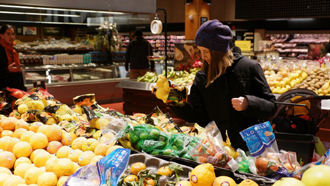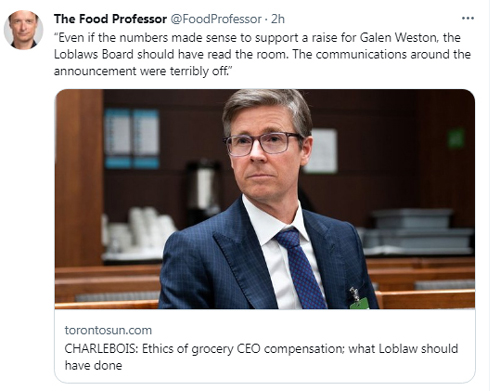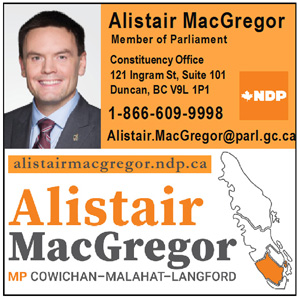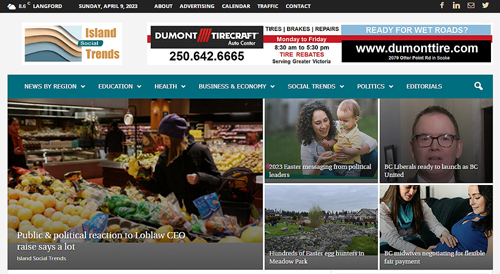Sunday April 9, 2023 | LANGFORD, BC [Updated April 10, 2023]
Editorial analysis by Mary P Brooke, B.Sc., Cert PR | Island Social Trends
The big pay bonus to Loblaw CEO was not tone deaf (as some are suggesting), but a reminder to Canadians (including politicians) as to the significant role that corporate grocery distributors play in supplying foods to every household which is a societal expectation and necessity.
The public huff and political outage about how much the President and Chief Executive Officer (CEO) of Loblaw, Galen Weston, gets paid — including his significant recent raise — has been making headlines and is the stuff of new reports and opinion-editorials.
At a time when grocery prices (and overall cost of living) are genuinely unbearable for many, the loud uproar in the public sphere and by political leaders who hope to defend the many Canadians who are struggling — is completely understandable.
However, while it’s not been news for decades that CEO of large corporations make astronomically more than their own lowest-paid workers or for many across the economy for that matter, now it seems to finally be hitting home for many Canadians as to how disparate the many spheres of the economy really are. And that it works that way for many economic reasons that are somewhat unique to Canada and in many ways also in the United States. It’s about class structure and keeping many people contained within the ‘middle class’ (now mostly the working class) and the low-income ranks (aka the poor).
Weston’s recent raise of $32 million in salaries and bonuses, was up 52% from 2022. This was following a consultant’s report commissioned by the Loblaw Board who determined that Weston was underpaid.
“Even if the numbers made sense to support a raise for Galen Weston, the Loblaws Board should have read the room. The communications around the announcement were terribly off,” wrote Dr. Sylvain Charlebois in an op-ed in the Toronto Sun a few days ago. Charlebois is senior director of the agri-food analytics lab and a professor in food distribution and policy at Dalhousie University.
“Galen Weston was the 35th best-paid CEO in Canada before the announced raise. With this salary bump, Galen Weston will likely become one of Canada’s best-paid CEOs, most certainly in the top five,” said Charlebois who is known in social media as The Food Professor.
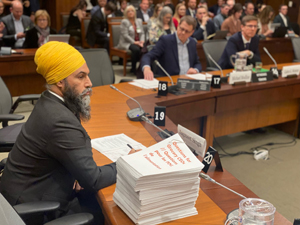
And the national NDP — led by Leader Jagmeet Singh — came out screeching mad about grocery prices and Loblaw corporate profits during the well-publicized and widely watched Agriculture and Agrifood House of Commons committee testimony session on March 8. They also appointed one of their MPs (Alistair MacGregor in Cowichan-Malahat-Langford, himself a small-production farmer) to be their Food Inflation Critic.
The Official Opposition Conservative Leader Pierre Poilivre is of course also saying prices are too high but that party doesn’t support (or criticizes) what the government (which they highlight is operating under a Liberal-NDP supply and confidence agreement) is doing to help Canadians.
Economic disparity:
The economic disparity of how people live in this country — and the damage of that to young families, seniors and anyone who doesn’t hook onto the high-salary level of the eocnomy — is finally coming to light is the ‘good’ news.
Now that people are aware of has over the lat 30 to 40 years become a bizarre economic landscape of have’s (and the super-have’s) and have-nots (and the extremely have-not), governments and political leaders might may different choices that lead to different policies.
Government supports:
In response to the evident impacts of unrelenting inflation increases over the past year (peaking at 8.1 percent in June 2022), the change to recognize and respond to people’s needs is actually creeping along.
That can be seen in the so-called one-time payments that the federal and BC governments are issuing to people whose income falls below certain thresholds.
- Most recently that was the doubled GST rebate in January and again this month (rebranded as the grocery rebate as a federal Liberal government signal that acknowledges the public outcry about food prices).
- In BC the BC Affordability Credits that have seen now three rounds under the provincial NDP government leadership, a flat $100 credit on BC Hydro bills for all of the utility’s customers in January, as well as a renter’s credit that will kick-in in 2024 (and won’t be clawed back in any way for people already receiving other low-income supports).
The federal Old Age Security has been raised for people over age 75 (assuming people age 65 to 74 are still working, which is a whole economic issue in itself), and the GIS has recently been increased for the lowest-income seniors.
Outrage is a form of dumbing-down:
But the outrage factor by political pundits and national NDP is actually a form of dumbing-down the support by those who should know better. People do hope for help, and deserve more than strident fist-shaking at the elite.
The outage swirling in media and social media seems to assume that low-income and financially stressed Canadians are unaware of the inequities of Canada’s economic system. That’s hardly the case. Some hard numbers were released in an Angus Reid poll a few days ago, showing just how much people are cutting back in a number of ways — not just groceries which is presumably a ‘discretionary’ expense, but also handling their financial savings, loans and cash flow differently.
And the outrage to say that Loblaw was ‘tone deaf’ as to giving their CEO a raise (a message also carried quite a bit by mainstream media) is an assumption. In reality, that was the corporate elite fighting back — they were not going to be blamed and shamed by a parliamentary committee. These are high stakes, and the corporate elite is showing that they won’t be played. Especially in the grocery sector; people may not realize the complexity of food distribution that reliably delivers food products and fresh food to their grocery basket.
Fixing the problem:
The next steps for the food price pundits and political leadership who have captured the attention of Canadians who naturally hope for a significant slow-down in food price inflation (in January the food inflation rate was 11.4 percent, and in February 2023 costs in grocery stores had risen by 10.6 percent to notch the tenth consecutive double-digit increase) should be evident and practical.
That would include bolstering the small-and-midsize food production sector (as the BC government says they aim to do), and coming up with realistic ways (like community food-growing networks such as the one at Royal Roads University, food-growing education programs, and a personal tax credit) to enable people to grow their own food in urban areas.
===== READER COMMENTS:
If have comments on this editorial or any articles within Island Social Trends, please send by email to news@islandsocialtrends.com .
Readers also comment via social media:
===== RELATED ARTICLES by ISLAND SOCIAL TRENDS:
- Food prices remain high, consumers hear more about grocery sector (Mar 11, 2023)
- Premier Eby announces $200 million for BC food security initiatives (Mar 7, 2023)
- Modern finance: seniors working past 65 (Mar 6, 2023)
- Three grocery CEOs to address federal agriculture committee (Feb 26, 2023)
- Food inflation riding high at 11.4% (Feb 21, 2023)
- Grocery chain CEOs being summoned to address Agriculture-AgriFood Committee (Feb 14, 2023)
- Alistair MacGregor leads NDP investigation into high food prices (Feb 13, 2023)
- BC food security direction includes watchful eye on California (Feb 6, 2023)
==== ABOUT ISLAND SOCIAL TRENDS:
Island Social Trends is a long-standing publication in the west shore of South Vancouver Island (fourth in a series that began with MapleLine Magazine 2008-2010, Sooke Voice News 2011-2013, and West Shore Voice News 2014-2020, which then emerged as Island Social Trends in mid-2020).
IslandSocialTrends.ca covers news of the Greater Victoria area and south Vancouver Island, with insights on BC and national issues.
Island Social Trends editor is Mary P Brooke, B.Sc. (Foods & Nutrition), Cert PR. She is a long-time journalist, delivering news through a socioeconomic lens, and now reports with the BC Legislative Press Gallery.
Island Social Trends continues to build the Island Social Trends Food Security Archive with articles about food security on south Vancouver Island and current developments around food sustainability across BC and nationally.


